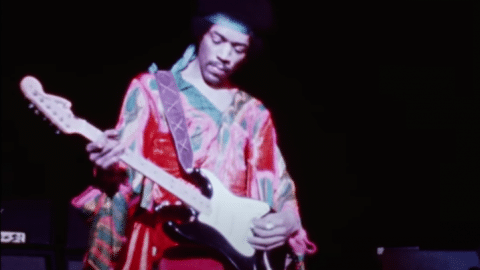20 Things Only 1970’s People Can Remember

via Jimi Hendrix/YouTube
The 1970s were a whirlwind of unforgettable events and cultural shifts. From the rise of disco to significant political upheavals, this decade was far from dull.
Let’s look into some of the most iconic moments of this era that left a lasting impact on history.
Apollo 13’s Return to Earth
On April 17, 1970, the world watched anxiously as Apollo 13, a NASA lunar spacecraft, made its dramatic return to Earth after suffering a severe malfunction en route to the Moon. The crew’s return led by mission commander James A. Lovell Jr., well demonstrated human ingenuity and resilience. Lovell’s spacesuit helmet is now a cherished exhibit at the Museum of Science and Industry in Chicago.
Tech Milestones: Introducing Floppy Disks, Betamax, and VHS
The early 70s saw the birth of groundbreaking technologies that would shape the future. In 1971, IBM began selling floppy disk drives, receiving a patent for the floppy disk in 1972. The mid-70s introduced revolutionary videotape players: Sony’s Betamax debuted in 1975, followed by JVC’s VHS in 1976, setting the stage for a new era in home entertainment.
The Napalm Girl: A Symbol of the Vietnam War
On June 8, 1972, the world was shocked by an image of nine-year-old girl Phan Thi Kim Phúc as she ran and screamed “Burning! Burning!” after a napalm attack in Vietnam. Associated Press photographer Nick Ut, captured this harrowing photo which highlighted the brutal reality of the Vietnam War. This image played a significant role in turning public opinion against the conflict.
Munich Olympic Massacre
The 1972 Munich Olympics were marred by tragedy when the terrorist group Black September attacked the Israeli team. They killed two athletes and took nine hostages, demanding the release of 234 Palestinians. The standoff ended in bloodshed at Fürstenfeldbruck military airport, resulting in the deaths of five terrorists, a German police officer, and all nine hostages, forever casting a shadow over the Olympic Games.
Watergate Scandal and Nixon’s Resignation
The Watergate scandal erupted on June 17, 1972, with the arrest of five men at the Democratic Party offices in Washington D.C.’s Watergate complex. The ensuing investigation revealed deep corruption within the Nixon administration. By August 1974, facing impeachment, President Richard Nixon resigned, marking the first and only resignation of a U.S. president.
Roe v. Wade and Abortion Legalized
On January 22, 1973, the U.S. Supreme Court’s decision in Roe v. Wade legalized abortion nationwide, striking down Texas laws that criminalized the procedure unless a woman’s life was at risk. This landmark ruling, stemming from a case brought by “Jane Roe” (Norma McCorvey), fundamentally changed women’s reproductive rights in America.
Chicago’s Sears Tower Hailed as A New Pinnacle
Completed in 1973, the Sears Tower in Chicago (now called the Willis Tower) became the world’s tallest building. It has a towering height of 1,450 feet built with 110 stories. This architectural marvel surpassed New York’s World Trade Center and remains a symbol of Chicago’s skyline and engineering prowess.
The Birth of Tech Giants: Apple and Microsoft
In 1975, Bill Gates and Paul Allen founded Microsoft, setting the stage for a technological revolution. A year later, Steve Jobs and Steve Wozniak established Apple in a garage, creating a company that would introduce groundbreaking products like the Mac, iPod, iPhone, and iPad. Both companies have profoundly influenced the tech landscape.
Tangshan Earthquake Tragedy
On July 28, 1976, a catastrophic earthquake struck Tangshan, China, killing an estimated 242,769 people, though some estimates suggest that the death toll was around 655,000. The magnitude 7.5 quake and its powerful aftershocks caused widespread devastation, marking one of the deadliest natural disasters in history.
Farewells to Icons: Hendrix, Elvis, and Chaplin
The 70s saw the loss of three cultural giants. Jimi Hendrix, the legendary guitarist, died on September 18, 1970, at age 27. Elvis Presley, the King of Rock ‘n’ Roll, passed away on August 16, 1977, at 42. Charlie Chaplin, the iconic comedian and actor, died on December 25, 1977, at 88, leaving behind an enduring legacy.
The 70s Movie Classics
The 1970s produced some of cinema’s greatest classics. Star Wars debuted in 1977, leading to a beloved trilogy. Francis Ford Coppola’s The Godfather (1972) and its sequel (1974) set new standards for filmmaking. Other notable films included Woody Allen’s Annie Hall (1977), Martin Scorsese’s Taxi Driver (1976), and Steven Spielberg’s Jaws (1975). The horror genre also thrived with The Exorcist (1973).
Torrijos-Carter Treaties: Panama Canal’s Return
On September 7, 1977, Panama’s head of government Omar Torrijos and U.S. President Jimmy Carter signed the Torrijos-Carter Treaties, agreeing to transfer control of the Panama Canal to Panama. Ratified by a plebiscite in Panama and approved by the U.S. Senate, this marked the end of 96 years of American control.
The Rise of Disco: Donna Summer and Village People
The late 70s saw the explosion of disco music, a genre-blending rhythm & blues, soul, funk, and Latin influences. Icons like Donna Summer, The Jackson 5, Chic, Gloria Gaynor, Barry White, The Bee Gees, KC and The Sunshine Band, Boney M., and Village People dominated the charts and dance floors.
The World Welcomes Pope John Paul II
On October 16, 1978, Karol Jozef Wojtyla of Poland became Pope John Paul II, the first non-Italian pontiff in over 400 years. His papacy played a crucial role in the fall of communism in Europe and improved the Catholic Church’s relations with Judaism, Islam, Eastern Orthodox Christianity, and the Anglican Communion. He was canonized on April 27, 2014.
New York City Blackout of 1977
On July 13-14, 1977, New York City experienced a 25-hour blackout caused by a lightning strike. The city, already grappling with economic decline and rising crime, plunged into chaos as vandals set over 1,000 fires and looters raided 1,600 stores. The blackout symbolized the city’s struggles during that era.
The First Test Tube Baby
Born on July 25, 1978 in Manchester, England, Louise Joy Brown became the world’s first baby conceived through in vitro fertilization (IVF). Her birth sparked controversy but also marked a significant advancement in reproductive medicine. IVF is now a common infertility treatment.
Jonestown Mass Suicide
On November 18, 1978, in Jonestown, Guyana, 918 members of the People’s Temple, led by American evangelical pastor Jim Jones, died in a mass suicide by consuming cyanide-laced drinks. This horrific event remains the largest collective suicide in history and a grim reminder of the dangers of cults.
Mother Teresa of Calcutta Wins Nobel Peace Prize
On October 17, 1979, Mother Teresa of Calcutta, born Agnes Gonxha Bojaxhiu, was awarded the Nobel Peace Prize for her efforts to alleviate poverty and suffering. Her work with the Missionaries of Charity inspired millions and highlighted the connection between peace and social justice.
Sony Introduces the Walkman
In July 1979, Sony revolutionized personal music consumption with the introduction of the Walkman, the first portable stereo sound player. It allowed people to listen to music privately while on the go and became a cultural phenomenon, paving the way for future personal devices like the iPod.
Iran Hostage Crisis
On November 4, 1979, following Ayatollah Khomeini’s rise to power in Iran, militants stormed the U.S. embassy in Tehran, taking 66 Americans hostage. Fifty-two hostages were held for 444 days. The crisis, exacerbated by a failed rescue attempt, ended in 1981 when the hostages were released following the death of Shah Mohammad Reza Pahlavi and a deal with Washington to lift some sanctions against Iran.
The 1970s were a decade of profound change and unforgettable moments. From technological innovations to political upheavals, from cultural milestones to tragic events, the 70s shaped the world in ways that continue to resonate today.



















